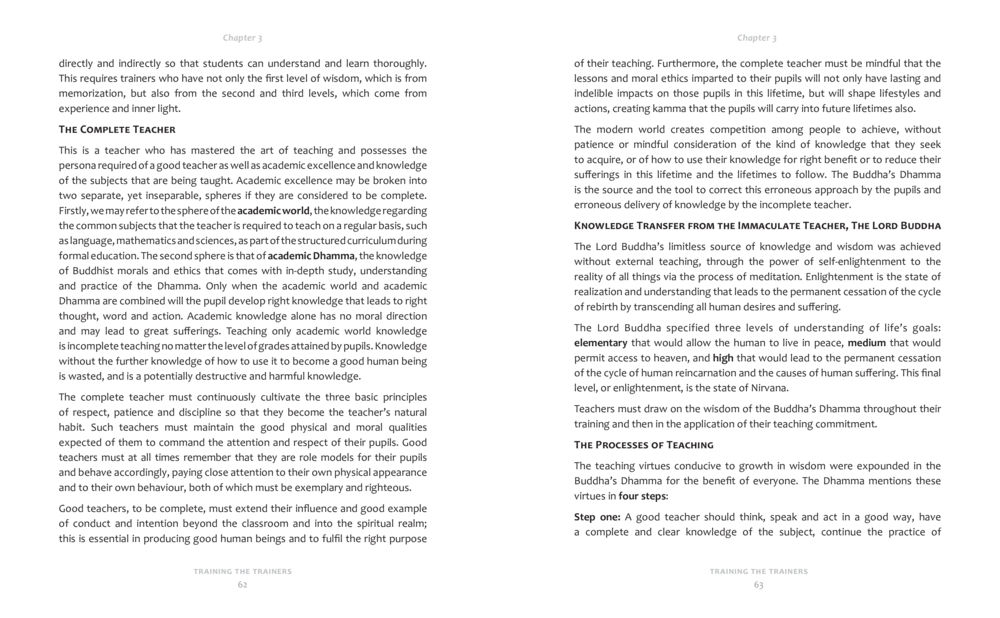The Complete Teacher: Integrating Academic Excellence and Dhamma in Education : หน้า 32/47
Training the trainer part 1 : หน้า 32/47 Exploring the qualities of a complete teacher and the integration of academic knowledge with Buddhist Dhamma for holistic education.
2 ครั้ง

สรุปเนื้อหา
บทนี้อธิบายถึงความสำคัญของครูในฐานะที่เป็นแบบอย่างและการผสมผสานความรู้ทางวิชาการเข้ากับธรรม เพื่อช่วยให้นักเรียนเติบโตเป็นคนดี เนื้อหายังกล่าวถึงระดับความเข้าใจที่พระพุทธเจ้าสอนเกี่ยวกับชีวิต สี่ขั้นตอนของคุณธรรมในการสอนเพื่อการเติบโตอย่างชาญฉลาด และการสอนแนวทางที่ถูกต้องอย่างมีจริยธรรมเพื่อสร้างผู้เรียนที่มีคุณภาพในปัจจุบันและอนาคต
หัวข้อประเด็น
-คุณสมบัติของครูที่สมบูรณ์
-การผสมผสานความรู้ทางวิชาการและธรรม
-การสร้างแบบอย่างที่ดีสำหรับนักเรียน
-ความสำคัญของการเรียนรู้ตลอดชีวิต
-อิทธิพลของธรรมในกระบวนการเรียนการสอน
ข้อความต้นฉบับในหน้า
Chapter 3
directly and indirectly so that students can understand and learn thoroughly. This requires trainers who have not only the first level of wisdom, which is from memorization, but also from the second and third levels, which come from experience and inner light.
THE COMPLETE TEACHER
This is a teacher who has mastered the art of teaching and possesses the persona required of a good teacher as well as academic excellence and knowledge of the subjects that are being taught. Academic excellence may be broken into two separate, yet inseparable, spheres if they are considered to be complete. Firstly, we may refer to the sphere of the academic world, the knowledge regarding the common subjects that the teacher is required to teach on a regular basis, such as language, mathematics and sciences, as part of the structured curriculum during formulation. The second sphere is that of academic Dhamma, the knowledge of Buddhist morals and ethics that comes with an in-depth study, understanding and practice of the Dhamma. Only when the academic world and academic Dhamma are combined will the pupil develop right knowledge that leads to right thought, word, and action. Academic knowledge alone has no moral direction and may lead to great sufferings. Teaching only academic world knowledge is incomplete teaching no matter the level of grades attained by pupils. Knowledge without the further knowledge of how to use it to become a good human being is wasted, and is a potentially destructive and harmful knowledge.
The complete teacher must continuously cultivate the three basic principles of respect, patience and discipline so that they become the teacher's natural habit. Such teachers must maintain the good physical and moral qualities expected of them to command the attention and respect of their pupils. Good teachers must at all times remember that they are role models for their pupils and behave accordingly, paying close attention to their own physical appearance and to their own behaviour, both of which must be exemplary and righteous.
Good teachers, to be complete, must extend their influence and good example of conduct and intention beyond the classroom and into the spiritual realm; this is essential in producing good human beings and to fulfil the right purpose
TRAINING THE TRAINERS 62
of their teaching. Furthermore, the complete teacher must be mindful that the lessons and moral ethics imparted to their pupils will not only have lasting and indelible impacts on those pupils in this lifetime, but will shape lifestyles and actions, creating kamma that the pupils will carry into future lifetimes also.
The modern world creates competition among people to achieve, without patience or mindful consideration of the kind of knowledge that they seek to acquire, or of how to use their knowledge for right benefit or to reduce their sufferings in this lifetime and the lifetimes to follow. The Buddha’s Dhamma is the source and the tool to correct this erroneous approach by the pupils and erroneous delivery of knowledge by the incomplete teacher.
KNOWLEDGE TRANSFER FROM THE IMMACULATE TEACHER, THE LORD BUDDHA
The Lord Buddha’s limitless source of knowledge and wisdom was achieved without external teaching, through the power of self-enlightenment to the reality of all things via the process of meditation. Enlightenment is the state of realization and understanding that leads to the permanent cessation of the cycle of rebirth by transcending all human desires and suffering.
The Lord Buddha specified three levels of understanding of life’s goals: externally that would allow them all the human to live in peace, medium that would permit access to heaven, and high that would lead to the permanent cessation of the cycle of human reincarnation and the causes of human suffering. This final level, or enlightenment, is the state of Nirvana.
Teachers must draw on the wisdom of the Buddha’s Dhamma throughout their training and then in the application of their teaching commitment.
THE PROCESSES OF TEACHING
The teaching virtues conducive to growth in wisdom were expounded in the Buddha’s Dhamma for the benefit of everyone. The Dhamma mentions these virtues in four steps:
Step one: A good teacher should think, speak and act in a good way, have a complete and clear knowledge of the subject, continue the practice of
Tags : #การศึกษา #ครูที่สมบูรณ์ #ปัญญา #ธรรม
หน้าหนังสือทั้งหมด
หนังสือที่เกี่ยวข้อง
Load More















































